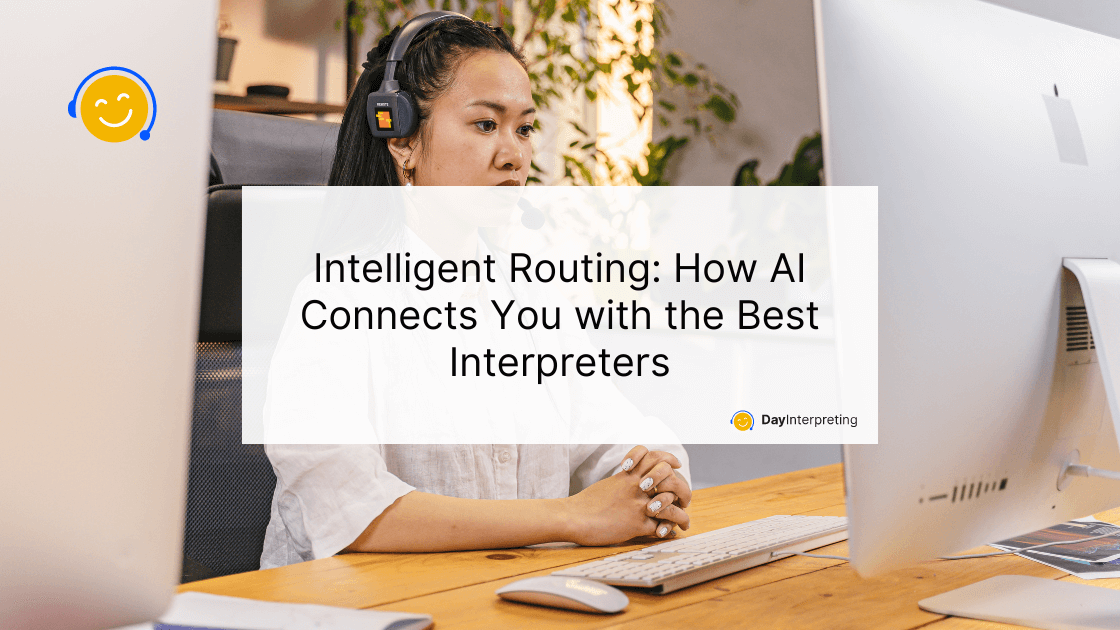Imagine you’re in a bustling market in a foreign country, and you want to buy a souvenir. You don’t speak the language, but you need to communicate with the shopkeeper. This is where intelligent routing comes in, making your life easier. But what exactly is intelligent routing (IR), and how does it work? Let’s dive into this fascinating topic and see how AI connects you with the best interpreters for your needs.
What is Intelligent Routing?
Intelligent routing is like having a super-smart assistant that knows exactly who to call when you need help. It uses artificial intelligence (AI) to connect you with the most appropriate interpreter based on your specific needs. Whether you need someone who speaks a rare dialect or an expert in medical terminology, intelligent routing makes sure you get the right interpreter.
How Does Intelligent Routing Work?
At the heart of intelligent routing is AI, which can quickly analyze tons of data to make the best decision. Here’s how it works:
- Understanding the Request: When you need an interpreter, you submit your request. This request can include details like the language pair (e.g., English to Mandarin), the field of expertise (e.g., legal, medical), and any other specific requirements you might have.
- Analyzing the Data: The AI system analyzes your request, looking at all the details. It compares this information with the profiles of available interpreters.
- Matching the Best Interpreter: Based on its analysis, the AI selects the interpreter who best matches your needs. This can include factors like language proficiency, expertise in a particular field, and even the time zone.
- Connecting You: Once the best interpreter is identified, the AI system connects you with them. This process happens in seconds, ensuring that you get the help you need without delay.
Why is Intelligent Routing Important?
Intelligent routing is a game-changer for several reasons:
- Efficiency: Traditional methods of finding an interpreter can be slow and cumbersome. Intelligent routing speeds up the process, saving time and reducing frustration.
- Accuracy: By using AI to match interpreters based on specific criteria, the chances of getting a suitable interpreter are much higher. This accuracy is crucial, especially in situations where precise communication is necessary, such as medical emergencies or legal consultations.
- Availability: Intelligent routing ensures that interpreters are available when you need them. The system can quickly identify who is free and connect you instantly.
- Cost-Effectiveness: Efficient use of resources means lower costs. Intelligent routing can help reduce expenses by minimizing the time spent searching for the right interpreter and ensuring quick and accurate communication.
Real-World Applications of Intelligent Routing
Intelligent routing isn’t just a theoretical concept; it’s used in various fields to make communication smoother and more effective. Here are some real-world examples:
Healthcare
Accurate communication between doctors and patients is critical in hospitals. IR can quickly connect medical professionals with interpreters who specialize in medical terminology, ensuring that patients receive the best care.
Legal Services
Precise language is essential in legal settings. IR helps connect lawyers and clients with interpreters who understand legal jargon, ensuring that nothing is lost in translation.
Customer Support
Companies use IR to provide better customer service. When a customer needs help in a specific language, the AI can instantly connect them with an interpreter who speaks that language fluently.
Travel and Tourism
Travelers often need help navigating foreign countries. IR can assist by connecting them with interpreters who can help with directions, local customs, and other travel-related queries.
The Future of Intelligent Routing
The future of IR looks promising. As AI technology continues to advance, we can expect even more sophisticated systems that can handle complex requests with greater accuracy. Some future developments might include:
- Enhanced Language Understanding: AI systems will get better at understanding nuances in different languages, including slang and regional dialects.
- Improved Personalization: Future IR systems could take personalization to the next level, learning from previous interactions to provide even better matches.
- Integration with Other Technologies: IR might integrate with other technologies like augmented reality (AR) and virtual reality (VR) to provide real-time interpreting in immersive environments.
- Broader Accessibility: As AI becomes more accessible, IR could be available to more people around the world, breaking down language barriers in even the most remote locations.
Wrapping Up
IR is a powerful tool that harnesses the capabilities of AI to connect users with the best interpreters based on their specific needs. It’s efficient, accurate, and essential in various fields, from healthcare to customer support. As technology advances, the potential for intelligent routing to improve our communication capabilities is vast, promising a future where language barriers are a thing of the past. So, next time you find yourself in a foreign market, remember that intelligent routing has your back, ready to connect you with the perfect interpreter in an instant!





0 Comments